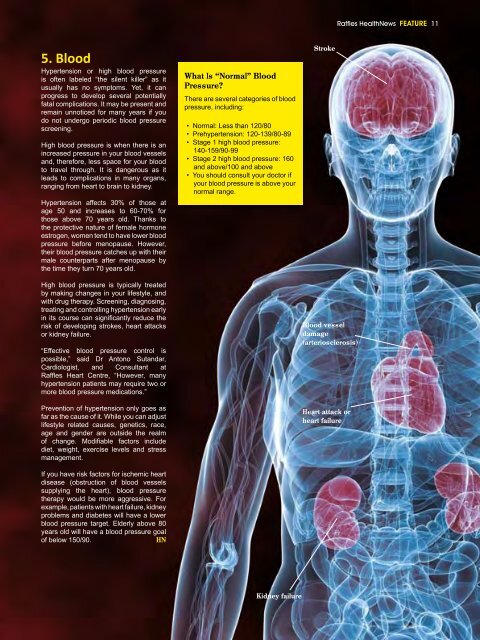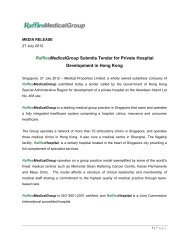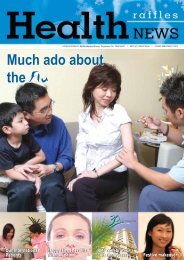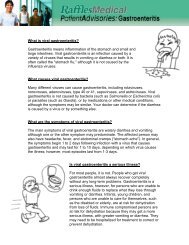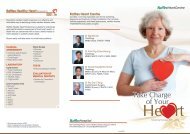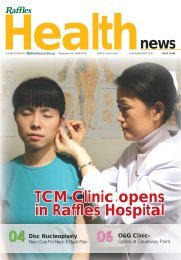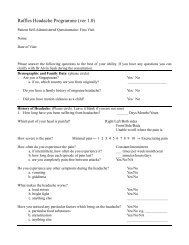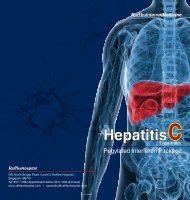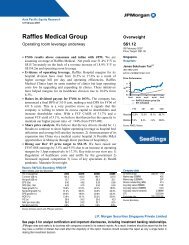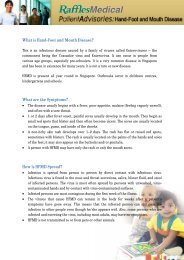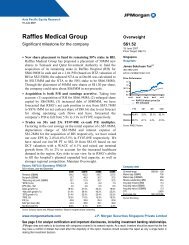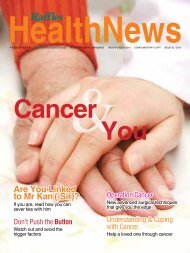Ageing Gracefully - Raffles Medical Group
Ageing Gracefully - Raffles Medical Group
Ageing Gracefully - Raffles Medical Group
Create successful ePaper yourself
Turn your PDF publications into a flip-book with our unique Google optimized e-Paper software.
<strong>Raffles</strong> HealthNews Feature 11<br />
5. Blood<br />
Hypertension or high blood pressure<br />
is often labeled “the silent killer” as it<br />
usually has no symptoms. Yet, it can<br />
progress to develop several potentially<br />
fatal complications. It may be present and<br />
remain unnoticed for many years if you<br />
do not undergo periodic blood pressure<br />
screening.<br />
High blood pressure is when there is an<br />
increased pressure in your blood vessels<br />
and, therefore, less space for your blood<br />
to travel through. It is dangerous as it<br />
leads to complications in many organs,<br />
ranging from heart to brain to kidney.<br />
Hypertension affects 30% of those at<br />
age 50 and increases to 60-70% for<br />
those above 70 years old. Thanks to<br />
the protective nature of female hormone<br />
estrogen, women tend to have lower blood<br />
pressure before menopause. However,<br />
their blood pressure catches up with their<br />
male counterparts after menopause by<br />
the time they turn 70 years old.<br />
High blood pressure is typically treated<br />
by making changes in your lifestyle, and<br />
with drug therapy. Screening, diagnosing,<br />
treating and controlling hypertension early<br />
in its course can significantly reduce the<br />
risk of developing strokes, heart attacks<br />
or kidney failure.<br />
“Effective blood pressure control is<br />
possible,” said Dr Antono Sutandar,<br />
Cardiologist, and Consultant at<br />
<strong>Raffles</strong> Heart Centre, “However, many<br />
hypertension patients may require two or<br />
more blood pressure medications.”<br />
Prevention of hypertension only goes as<br />
far as the cause of it. While you can adjust<br />
lifestyle related causes, genetics, race,<br />
age and gender are outside the realm<br />
of change. Modifiable factors include<br />
diet, weight, exercise levels and stress<br />
management.<br />
If you have risk factors for ischemic heart<br />
disease (obstruction of blood vessels<br />
supplying the heart), blood pressure<br />
therapy would be more aggressive. For<br />
example, patients with heart failure, kidney<br />
problems and diabetes will have a lower<br />
blood pressure target. Elderly above 80<br />
years old will have a blood pressure goal<br />
of below 150/90.<br />
HN<br />
What Is “Normal” Blood<br />
Pressure<br />
There are several categories of blood<br />
pressure, including:<br />
•<br />
•<br />
•<br />
Normal: Less than 120/80<br />
Prehypertension: 120-139/80-89<br />
Stage 1 high blood pressure:<br />
140-159/90-99<br />
Stage 2 high blood pressure: 160<br />
and above/100 and above<br />
You should consult your doctor if<br />
your blood pressure is above your<br />
normal range.<br />
•<br />
•<br />
Stroke<br />
Blood vessel<br />
damage<br />
(arteriosclerosis)<br />
Heart attack or<br />
heart failure<br />
Kidney failure


